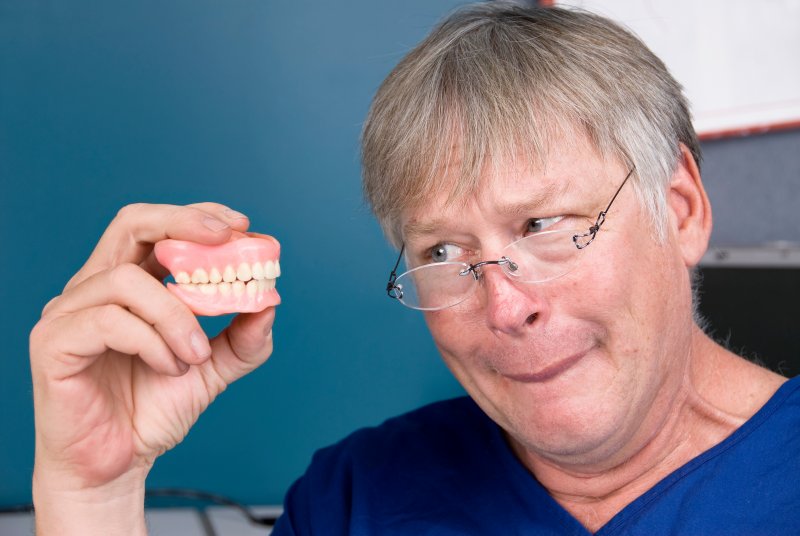
Without a doubt, dentures can help anyone eat better meals. Their prosthetic teeth are durable and functional, so they chew foods more easily than a toothless mouth would. That said, it’s still a fact that dentures affect nutrition in rather bad ways. You may want to link them to dental implants so your restored smile works as well as it looks. As for the details, read on to learn more from your local Tustin dentist.
Context: Dentures & “Bite Force”
Before you grasp how dentures affect nutrition, you must learn how they impact your bite. The second set of facts helps you understand the first.
Dentures simply can’t “chew” food like natural teeth do. Since these prosthetics are removable and insecure, they can’t exert a very strong or powerful bite. Even the best dentures only give you a fraction of your former smile’s bite force. That being the case, they can’t thoroughly grind or tear pieces of your food apart.
Put another way, dentures offer limited help with meals. They make eating easier but still don’t “work” as well as a fully natural smile would.
How Dentures Affect Nutrition
Dentures’ low bite force doesn’t just impact how easily you eat. Over time, it deprives your body of key nutrients that maintain physical fitness.
Don’t forget that chewing is the first step in your body’s digestive process. Since this act breaks food into small, easy-to-absorb particles, it contributes to physical health. However, dentures break food into larger pieces that the stomach struggles with; they thus force you to swallow earlier. These effects keep your body from fully absorbing your meals’ nutrients.
This lack of nutrition may not affect you much in the short term. Still, it may cause you to suffer from indigestion, fatigue, and worse after a while.
The Solution: Dental Implants
Luckily enough, dental implants can help with the nutrition problem. Attaching them to your dentures would ensure you get enough nutrients from meals.
Unlike a regular one, an “implant denture” won’t saddle you with a low bite force. Its dental implants secure the whole device to your mouth, restoring most (if not all) of your bite’s strength. That means it’ll let you chew food into small and digestible pieces so you can absorb all the nutrients from your food.
Dentures affect nutrition, but that doesn’t mean you’re powerless. Talk to your dental provider about adding dental implants to them!
About the Practice
Zhang Dental Group of Tustin is based in Tustin, CA. Led by Dr. Zhang himself, our practice takes a gentle and patient-focused approach to dentistry. We always tailor our preventive, cosmetic, and restorative services to each person’s smile, ensuring the best results possible. You and your family can trust us to make your grins truly healthy and beautiful! For more details or to book a visit, please contact us on our website or by phone at (714)-465-5589.

